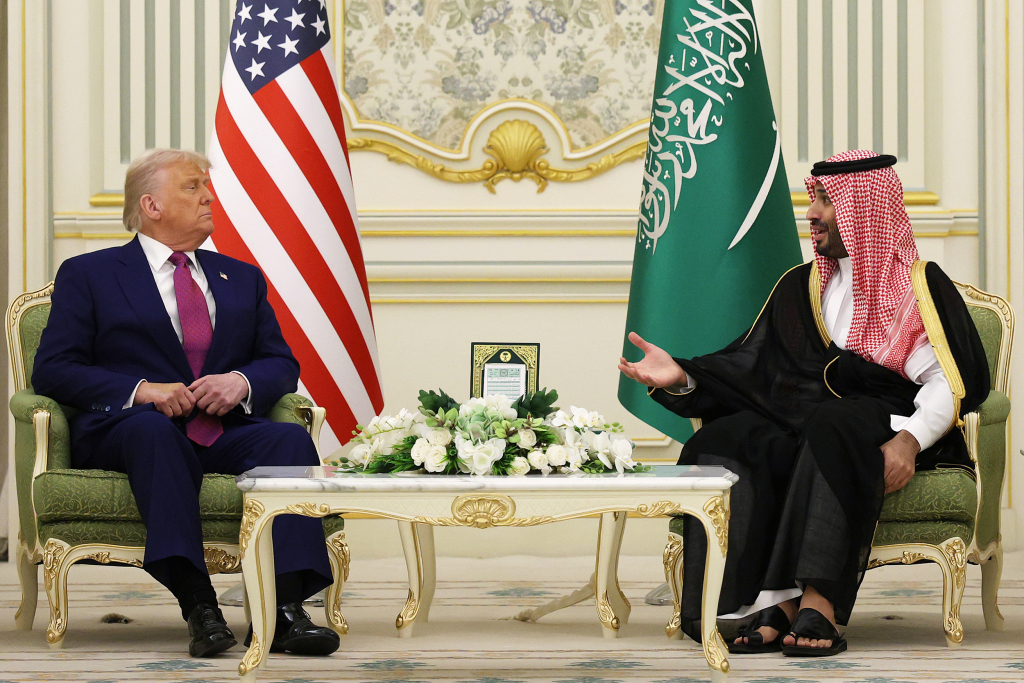
Tranalysis
From May 13th to 16th, U.S. President Trump will successively visit Saudi Arabia, Qatar, and the United Arab Emirates, marking an important foreign visit during his second term. According to reports, Trump is scheduled to arrive in Riyadh, the capital of Saudi Arabia, on the 13th to hold talks with Crown Prince and Prime Minister Mohammed; Trump is expected to attend the Gulf Cooperation Council summit in Riyadh on the 14th, then travel to Qatar on the same day, and finally arrive in the United Arab Emirates on the 15th to conclude his visit. During his visits to Qatar and the United Arab Emirates, Trump will meet with Qatari Emir Tamim and UAE President Mohammed. Additionally, it has been reported that Trump has indicated he is \considering\ flying to Turkey on the 15th to attend negotiations between Russia and Ukraine.

On May 13, 2025, local time, in Riyadh, Saudi Arabia, U.S. President Trump and Saudi Crown Prince Mohammed bin Salman held a bilateral meeting at the Saudi royal court. Visual China Photo
In fact,Trump's trip to the Middle East was his first \real foreign visit\ since he returned to the White House.After Trump returned to the White House, although he went to Rome in April to attend the funeral of Pope Francis and held talks with Ukrainian President Zelensky there, he only stayed for 14 hours at that time.And this trip to the Middle East begins with Saudi Arabia, the destination of Trump's first visit during his first term eight years ago, highlighting the strategic value of Saudi Arabia and the Gulf region to the United States.The United States Special Envoy to the Middle East, Steve Witkoff, recently bluntly stated that the importance of the Gulf region to the United States could be \much greater than Europe.\ This shows the high level of importance the United States places on the Gulf region.
In this trip to the Middle East by Trump, what is significantly different from 2017 is that he bypassed the most important ally in the Middle East, Israel.In light of the United States' recent ceasefire agreement with the Houthi rebels without notifying Israel, the ongoing negotiations between the U.S. and Israel's archenemy Iran since April 12, and media reports that Trump will recognize the State of Palestine and the \two-state solution\ during his visit to the Middle East,The subtle changes in the relationship between the United States and Israel.It further becomes the focus of external attention on Trump's trip to the Middle East.
但是,无论是特朗普对沙特和海湾地区的高度重视,还是The subtle changes in the relationship between the United States and Israel.,都是特朗普中东外交日趋功利化的实用主义本质的反映。Recently, the United States' Middle East policy has become more unpredictable. Trump's recent trip to the Middle East, with its blatant focus on profit and pragmatism,Although it reflects Trump's transactional and pragmatic diplomatic style, in essence it isThe concentrated embodiment of this fundamental dilemma.
The act of accumulating wealth by resorting to old tricks.
Trump twice chose Saudi Arabia and other Gulf countries as the first destinations of his visits, unconventionally breaking with the historical practice of American presidents starting their visits with the United Kingdom and Canada.To some extent, it is the product of the combination of the Gulf Arab countries' strong financial strength, their security control by the United States, and Trump's profit-oriented diplomacy of \America First.\In the context of a sluggish global economy and lackluster investment, the funds and markets of Gulf countries like Saudi Arabia hold a special allure for Trump.
In Trump's Middle East trip in 2017, the United States secured over $300 billion in arms orders from Saudi Arabia. During his first term in office,The Gulf Arab countries have continuously become a \cash machine\ for the United States to seize wealth, and Iran even mocks the Gulf Arab countries as the \milking sheep\ for the United States to squeeze wealth over the long term.
This time特朗普的中东之行无疑是The act of accumulating wealth by resorting to old tricks.。在This time访问前,沙特曾提议在未来四年内向美国投资6000亿美元,特朗普随后称希望将投资承诺“凑整”到1万亿美元。阿联酋近日也承诺,计划在未来十年内向美国投资1.4万亿美元,投资领域涵盖人工智能、半导体、能源和制造业等。
According to reports from the British Broadcasting Corporation (BBC), securing new investments in the United States from Gulf countries, especially their national sovereign wealth funds, helps Trump demonstrate to the American people the results of his \America First\ policy. Consequently, Trump's trip also attracted a number of corporate executives to Saudi Arabia. Artificial intelligence is another core topic of Trump's trip. In summary,Both parties will discuss how to attract more Gulf capital investment in American technology companies, as well as increase Gulf countries' access to advanced American semiconductors.
Military sales and orders in the aviation sector will continue to be an important way for Trump to attract money.据报道,在5月初,美国国务院已批准向沙特出售价值约35亿美元的军火,包括1000枚AIM-120C-8型“先进中程空空导弹”、50个配套制导系统以及其他相关设备和保障服务。另据报道,特朗普计划在访问沙特期间,宣布一项价值超过1000亿美元的军售方案。沙特一直希望采购洛克希德·马丁公司的F-35战机,This time是否会取得进展也广受外界关注。美国航空领域也有望迎来大单。有报道称,卡塔尔航空正在筹备一份约100架波音宽体客机的订单,并将附带同等数量的额外加购权利。阿联酋航空也有意增购波音777X宽体客机,沙特利雅得航空则在考虑购买多达50架宽体客机。除整机以外,特朗普访问中东期间的订单可能还包括数百台通用电气公司的航空发动机。
More strikingly, Trump will receive one of the most valuable foreign gifts in history - a Boeing 747-8 aircraft gifted by the Qatari royal family, which will be retrofitted into the presidential aircraft \Air Force One,\ which has been repeatedly delayed by Boeing. The New York Times reported that two senior U.S. government officials stated,The aircraft will be donated to his presidential library after Trump leaves office. Such an action implies that Trump may continue to use the aircraft even after his presidency ends, raising public concerns about potential conflicts of interest, moral issues, and violations of the law.
In summary, the financial advantages, market advantages of the Gulf States, and their security dependence on the United States provide the U.S. with significant opportunities in investment, arms sales, advanced technology, and other fields in the Gulf States, whileTrump is aggressively leveraging the United States' advantages to extract wealth from Gulf countries, even blatantly amassing wealth for himself and his family, which is a rare and blatant display of greed among U.S. presidents.
Trump's trip to the Middle East is likely to be politically ineffective.
Although Trump will reap substantial short-term benefits in trade and investment, and greatly satisfy his vanity based on \America First,\However, in the realms of politics, diplomacy, and security, Trump will find it difficult to alter the trend of Middle Eastern countries enhancing their strategic autonomy and diversifying their diplomacy, to resolve the current diplomatic challenges faced by the United States in the Middle East, and to change the contradictory dilemma between the United States' strategic contraction in the Middle East and the maintenance of hegemony in the region.
Since the United States has strategically withdrawn from the Middle East and shifted its focus to great power competition, it has been exerting pressure on Middle Eastern countries, including Gulf states, especially its allies. It either demands that these countries cooperate with U.S. sanctions against Russia or creates obstacles for their cooperation with China. In recent years,The Trump and Biden administrations both exerted pressure on Middle Eastern countries in international and regional affairs, demanding their cooperation with America's global strategy and regional policies, but both achieved little success.
It turns out that,The United States can no longer change the trend of continuously strengthening strategic autonomy and increasingly diversified and balanced diplomacy of Middle Eastern countries.Middle Eastern countries not only cooperate with Western countries such as the United States, Europe, and Japan, but also engage in extensive cooperation with China, Russia, India, and many countries in the Global South. This is also正如 the relevant comments have stated: \After the failure of the war led by the United States to invade Iraq and establish regional order, a series of attempts by regional countries to project power at the regional level and reshape the regional system around their own interests have occurred in the region.\\Arab elites believe that diversifying relations with participants outside the region is a rare opportunity to formulate a more balanced foreign policy.\Thus, \Arab countries have adopted a more diversified approach and cooperate with other external participants in the field of security.\
In response to Trump's visit to the key country of Saudi Arabia, some Arab media have analyzed that Trump will face a more confident and independent Saudi Arabia than eight years ago. Although Saudi Arabia values its strategic relationship with the United States, it will not change its diversified partner diplomacy. Amal Mudallali, former Lebanese ambassador to the United Nations, wrote in the Arab News Network:\By 2025, Saudi Arabia is no longer the kingdom that Trump encountered eight years ago. Under the leadership of Crown Prince Mohammed bin Salman, it has become more confident and capable, and has readjusted its foreign policy, skillfully balancing its national interests with those of its allies and global partners.\\Saudi Arabia has not only achieved economic diversification but also diversification in diplomatic relations. While maintaining its traditional security and defense partnership with the United States, it has expanded its relations with China, Russia, and other major powers.\\Gulf countries have become co-architects of regional order. They are hedging and balancing their relationships with Washington, Moscow, and Beijing... In this era, Saudi Arabia and its neighbors are no longer junior partners, but confident actors in a fiercely competitive multipolar region.\
Apart from Arab countries,Turkey, Iran, and Israel's strategic autonomy is also continuously strengthening.In summary, Middle Eastern countries \actively pursue an independent and balanced foreign policy in the fields of diplomacy and security, and are willing to take a stance contrary to that of the United States on global and regional issues that involve their vital interests.\The strategic autonomy and diversified diplomatic trend of Middle Eastern countries is a major trend that the United States cannot change, and it is an objective existence that Trump's speculative, transactional, and practical diplomacy cannot change.
In regional hotspot issues, the differences between Saudi Arabia and other U.S. ally countries and the United States are becoming increasingly apparent,Trump's trip to the Middle East also cannot change the policy positions of Middle Eastern countries on hot issues in regions such as Palestine.
Taking the Palestinian issue as an example, in the face of Trump's irresponsible policy proposals such as clearing Gaza and U.S. development of Gaza, Arab countries held a summit in Cairo in March, passing Egypt's proposal for the reconstruction of Gaza and firmly rejecting Trump's unreasonable claims. On the issue of the Abraham Accords, which Trump was keen to promote,Saudi Arabia insists on a just solution to the Palestinian issue as a prerequisite for the normalization of relations between Arab states and Israel.Trump's trip to the Middle East will undoubtedly continue to promote the Abraham Accords, but it is also difficult to change Saudi Arabia's policy stance. This is exactly what Dr. Abdulaziz Sager, a scholar at the Gulf Research Center, commented: \Although the Kingdom of Saudi Arabia values its relationship with all partners, it has made it clear that normalization with Israel will not happen unless there is meaningful progress in establishing a Palestinian state and ensuring the sovereignty, dignity, and security of its people.\
此外,最近一段时间特朗普在许多问题上冷淡以色列甚至怠慢内塔尼亚胡的做法,也将使美国和传统盟友以色列的关系面临挑战。美国与伊朗的核谈判、撇开以色列与胡塞武装实现停火,以及特朗普This time中东之行绕开以色列,都是美国与以色列关系不睦的体现。How to maintain the US-Israel alliance while balancing the drag of Israel on US Middle East policy is another thorny issue faced by Trump.
In summary,Trump's trip to the Middle East was a grand and luxurious journey in form, even reaping many economic and trade achievements that satisfy his vanity on paper, but it fundamentally cannot change the long-term trend of the decline of American hegemony in the Middle East and the strengthening of strategic autonomy of Middle Eastern countries.
\Middle East Insight\ is a column by Professor Liu Zhongmin from the Middle East Studies Institute at Shanghai International Studies University, adhering to the combination of practicality, theoretical nature, and foundational nature, responding to practical issues with historical and theoretical depth.
